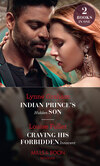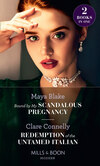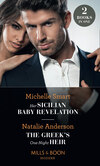Kitabı oku: «Forbidden Pleasure», sayfa 3
Did he feel it too? She looked up, saw the beautiful mouth compress, harden.
‘All right?’ he asked abruptly, releasing her when he was sure she had regained her balance.
She managed to smile. ‘Yes, thank you.’
‘Do you need to rest?’
‘No,’ she said, adding with hasty firmness, ‘And I don’t need to be carried, either.’
He was frowning, the brilliant eyes resting on her leg. ‘Will it always be likely to let you down?’
‘No, they tell me it’s going to be a lot better as soon as the muscles strengthen.’
Her surgeon had suggested she walk to build up the muscles, but she hadn’t because she’d cringed at the idea of people pitying her as she limped by. Well, that very evening she’d begin exercising, and ignore the stares and whispered comments.
The decision buoyed her spirits. With erect back and shoulders she said goodbye and drove carefully down the drive, concentrating fiercely to stop the odd desolation that roiled inside her.
At the bach she pushed all the windows open before going out onto the verandah overlooking the lake and collapsing into one of the elderly chairs to read the newspaper.
After ten minutes or so, she dropped it on the floor, feeling oddly detached, as though somehow she’d slipped through a transparent door and into another world.
The two men shaking hands on the front page weren’t statesmen signing an important treaty; they were smirking actors chosen to fill empty space on the page. The people marching in the streets of the capital city in a tiny state somewhere on the Adriatic Sea were extras from an old movie, selected for their lined, worn faces and dressed by Wardrobe in thick, drab peasants’ clothing.
Only the photograph of children playing in the sea meant anything; yes, she thought, looking at them with her heart compressed into a painful knot, they were real, they were complete and oh, they were lucky.
To break the soggy spell of self-pity, she strode over the thick, springy kikuyu grass to the edge of the busy beach. Small children ran around happily, yelling and laughing, many swam in the milky band of water that denoted the shallows.
Ianthe closed her eyes but immediately forced her lashes back up. Beneath her breath she muttered, ‘I’m not going to stand here like a wimp,’ and walked across the blinding white sand.
Nausea clutched her before she’d gone halfway. Breathing shallowly, fighting back the panic that turned her clammy and shaking, she forced herself to stand there for long, chilling moments before turning and stumbling back.
A couple of youths were passing; through the roaring in her ears she heard one jeer, ‘Hey, blondie, need some help?’
Intent only on reaching sanctuary, she blundered past. His companion said something and followed it up by catching her arm.
A voice cracked out across the beach. ‘Let her go.’
They swivelled around, both assuming the swaggering, aggressive posture of a male whose territory has been violated. Heart thudding painfully in her throat, Ianthe froze.
Alex Considine was taller than they were, but they were stocky, tight-skinned and muscular, with necks wider than their heads, their macho strut a violent contrast to his athletic grace. Yet such was the dark power of Alex’s personality that after one glance the man who held Ianthe dropped her arm as though her skin burned his fingers, and the other said uneasily, ‘She’s OK, mate. We thought she was going to fall over,’ before stepping back and decamping.
Alex didn’t even watch them go. ‘Are you all right?’ he demanded as he closed the gap between them with a couple of long strides. His hands fastened onto her, holding her up by her shoulders, and for a paralysing moment she was exposed to the full intensity of his gaze.
Ianthe knew she had skin the colour of cottage cheese and dark blotches under her eyes. She swallowed to ease her dry mouth, but could only croak, ‘Yes.’
Alex’s quiet, ‘What the hell is the matter with you?’ made her stomach leap.
She dragged in a deep, shuddering breath. ‘I’m sorry,’ she said stupidly, trying to overcome the empty sickness of fear.
He said, ‘Come on,’ and turned her towards the bach. A steel-hard arm buttressed her, giving her the strength to climb the low bank. ‘We’ll go inside,’ he said, his voice oddly distant.
Numbly she obeyed the crisp command and crossed the wide back verandah, where chairs sat in shabby communion. As they passed the low table he picked up a plastic bag.
‘What are you doing here?’ Ianthe asked woodenly after he’d pushed the door open and let her go through.
‘You forgot your frozen goods.’ Without asking permission he put the bag into her small freezer compartment. ‘You need some stimulant. I’ll make coffee.’
She clenched her jaw to keep her teeth from chattering. ‘I don’t want anything, thanks. I’m fine now.’
Ignoring her, he opened the door into the fridge and removed a jug of orange juice. ‘This will do,’ he said, pouring a glass and bringing it across to her. ‘Sit down,’ he ordered, his unwavering gaze commanding her obedience.
It was too much trouble to protest, so she collapsed ungracefully into a chair. He waited until she’d pushed the heavy, clinging hair back from her face, then offered the glass. Accepting it, Ianthe watched with outrage and dismay as it wobbled in her hand.
‘I’ll do it,’ Alex Considine said abruptly, and took it back, holding it to her mouth so that she could sip the sweetly tart liquid.
It helped. Soon she felt secure enough to take the glass and gulp down more of the juice.
He waited until she’d almost finished before asking evenly, ‘What happened? What did they say to you?’
‘It wasn’t them.’ She dismissed the two men.
‘Then what?’
His level voice didn’t fool her; she wasn’t going to be able to fob him off. Ianthe bent her head so that she couldn’t see the narrow masculine hips, the long muscular legs. The silence hummed, strident with the confusion in her head, in her heart.
Eventually she said, ‘I had a dizzy turn.’
Although he said nothing, his disbelief was patent.
Slowly she finished the juice. ‘Thank you,’ she said, her throat thick.
‘Look at me,’ he ordered.
Lifting her chin was a mistake, and staring him full in the eyes, daring him to take the issue any further, was an even bigger one. Alex’s pale gaze drilled through her meagre defences.
‘Have you got sunstroke?’ he asked.
It would have been a pat answer, but she shook her head. Lies didn’t come easily to her. ‘No. I just felt a bit—over-whelmed.’ She couldn’t breathe in the hot room and her skin was too sensitive, too tight. ‘I think I’d rather be outside,’ she said, forcing her voice into something like normality. ‘It’s cooler on the verandah.’
‘All right. Do you need help?’
‘No!’ She tried to soften the blunt refusal. ‘I feel much better now.’
But once outside she realised she needed activity to burn off the adrenalin that still pumped through her body. Looking towards the motor camp, she asked aggressively, ‘Would you like to go for a walk and see how the other half spend their holidays?’
With a keen look he answered crisply, ‘Why not?’
Nothing had changed. Children, hatted and slick with sunscreen, still laughed and called in clear, high voices, still splashed in the chalky water that stretched out to where the lake bed dropped away.
The edge was still as sharp and sudden against the fierce, glinting blue of the deeper water.
Ianthe averted her eyes and concentrated hard on walking through the holidaymakers without giving away how aware she was of the man who strode beside her. Sand crunched beneath their feet. Alex looked around, the fan of wrinkles at the corners of his eyes slightly indented. How old was he? Thirty-three or four, she guessed.
He said, ‘This place reminds me of the village I lived in until I was ten.’
Intrigued, Ianthe was stopped from asking questions by an indefinable reserve in his tone, in the angular, aristocratic line of his profile.
They walked around families, past groups of teenagers indulging in their noisy, unsophisticated courtship rituals, and as they went by Ianthe felt the eyes, some on her, some on Alex. She was accustomed to being watched; it interested her that Alex too had developed a way to deal with onlookers. He didn’t make eye contact, he walked steadily—not fast, not slow—and although he swivelled when a child shrieked behind them he turned away again immediately he realised it was under supervision.
Who was he? She recognised his name, so possibly he had turned up in a newspaper. However, she had a strongly visual memory; if she’d seen a photograph of him she’d have remembered his startling good looks and pale eyes instead of merely being haunted by a vague familiarity.
Yet would any photograph capture the magnetism of his personality, or the aura of uncompromising authority?
Probably not, and she wasn’t going to think about it any more. That way lay danger.
Although she’d snatched up a straw hat as they left the bach, the sun beat down on her shoulders and summoned a rare blue sheen from Alex’s bare head. She should tell him he needed some protection, but it seemed an oddly personal and intimate thing to talk about.
‘You obviously know this place very well,’ Alex commented.
Nodding, she kept her eyes on the low bushes—a mixture of sedges, rushes and sprawling teatree—that scrambled from the pine plantation to the water, effectively marking the limit of the beach. ‘For years I spent every school holiday here with my best friend. Her parents own the bach.’
Once she’d known every inch of the shoreline. In those long, golden, distant summers she and Tricia had spent every day on or in the lake. And now Tricia was a wife and mother, and Ianthe was trying to reassemble her life.
‘We’d better go back,’ she said evenly. ‘It’s swampy in there.’ She glanced down at his feet and added with a spark of malice, ‘You won’t want to get those shoes wet.’
He laughed softly. ‘I’d noticed that I was overdressed,’ he said, turning the tables neatly on her.
Biting her lip, she swivelled, and of course her wretched leg chose just that moment to let her down again. Gasping, she jerked back, but too late. Her sideways lurch had thrown her into the tangle of bushes, and her foot sank into the lake so that water rose halfway up her calf.
Panic, sickening and immediate, clawed at her. For a horrifying second she couldn’t move, until the clamouring terror forced her free of the water. Whimpering, she pushed past Alex, blundering across the hot sand in a desperate rush to reach the safety of solid ground.
CHAPTER THREE
SHE was almost there when hard hands caught her, gripping her cruelly until she stopped fighting and went limp against him, panic giving way to a shamed exhaustion.
‘All right,’ Alex said quietly. ‘It’s all right, Ianthe. You’re safe.’
‘I know,’ she choked, trying to pull away, because it was too easy to surrender mindlessly to his disciplined toughness.
A simple offer of comfort, she told her hammering heart, that was all it was. He’d given her the only things she could take any consolation from—the tempered support of his body, the knowledge that she wasn’t alone.
Swiftly he turned, forcing her around so that his broad shoulders sheltered her from any curious stares, then let her go. A quick glance informed her that no one had noticed, and some of the tight knot of humiliation eased.
But when she looked back at Alex she couldn’t escape those enigmatic eyes, eyes that goaded her into muttering, ‘Don’t you pity me.’
Something predatory prowled through the icy depths. ‘Pity you?’ His smile was taut and compelling. ‘I don’t pity you, Ianthe Brown. Far from it.’ Strong fingers bit into her arm, turned her, tucked her hand in the crook of his elbow. ‘All right, we’ll walk back in the shade of the trees. What birds do you usually see on the lakes?’
Ianthe forced herself to respond. ‘Dotterels nest in scrapes in the sand, and in spring and autumn the lakes are a staging point for migratory birds.’ As she answered his questions her voice sounded flat and dull, but by the time they got back to the bach the black panic had withdrawn into its lurking limbo on the borders of her mind.
She said, ‘I’d like to sit outside.’
He waited until she’d chosen a shabby, comfortable chair, then leaned against the railing and looked down at her. Without preamble he commanded, ‘Tell me why a woman who’s terrified of the water should choose to stay no more than twenty-five metres away from it.’
She owed him an explanation, but all she could say was a muted, ‘I just have to get used to it again.’
His scrutiny pierced her fragile shell of composure, splintering it into shards. At the end of the most tense silence Ianthe had ever endured, he asked, ‘Haven’t you been able to go in the water since the shark attacked you?’
‘No.’ Her voice was hoarse. She cleared her throat and went on, ‘It’s not the water. It’s teeth. I dream of dolphins, and they play and smile, and then their smiles turn into teeth and—and—I’m terrified something will catch me and drag me down, and that this time I’ll die.’
‘Ianthe,’ he said deeply, and came across and sat down beside her, took her tense hand in his strong, warm one.
Something snapped inside her. Hastily, indistinctly, she muttered, ‘I’m not scared of water—I can wallow in a bath and clean my teeth without flinching, drive across the Harbour Bridge without turning a hair, even walking along the beach is all right. But if I—well, you saw.’
‘So you came here to get over it?’
Ianthe shivered at the savage irony of his tone. With eyes fixed on the vivid cobalt surface of the lake she said, ‘This is where I learned to swim. Tricia and I splashed around in the shallows, then her mother taught us the strokes and jollied us into swimming properly. It seemed the most natural thing in the world—and so utterly safe. That first summer she wouldn’t let us swim through the wall—it was out there in front of us, tantalising and forbidden. Do you know what I mean?’
‘By the wall? I presume it’s the drop-off into deeper water. I’d noticed it—it’s unusually obvious.’ He spoke with a cool intonation, as though measuring every word he said.
‘The bed of the lake is actually below sea level. That depth and the extreme clarity of the water and the brilliant whiteness of the sand all combine to make the wall.’ Keeping her head averted, she eased her hand away from his grip. Her pulses thudded through the fragile veins at her wrist and she looked at his hand, lean-fingered and competent.
But not relaxed, she thought with a bleak surprise. No, there was tension in those tanned fingers and she could feel it crackle around her. Not that she blamed him; she was probably embarrassing him horribly. No doubt he couldn’t get away fast enough.
Straightening her back, she stared blindly across the verandah and went on, ‘Swimming through it is like breaking through a barrier, free-falling into another dimension. However often I did it I always loved it, that moment when I burst through into the blue. I felt strong and different, the sort of person who could do anything.’
‘You are the sort of person who can do anything,’ he said curtly. ‘This is temporary, a normal response to the trauma of pain and shock and terror.’
Anger ricocheted through her, hot and sudden and fierce. ‘I can’t even put my feet into the water! I’d hoped that coming here would help—after all, the biggest wildlife in this water are eels.’ Her voice bit sardonically into the words. ‘And they’re not noted for ferocious attacks on human beings.’
‘So it hasn’t worked yet. Give it time, and it will.’ He got to his feet and walked across to the rail, leaning against it to look over the lake.
Numbly Ianthe watched the muscles of his thighs flex, the lithe grace as he moved. ‘I’m beginning to wonder,’ she said bleakly. ‘You saw me when I tripped. It’s called a panic attack.’
‘You expect too much, too soon. Have you had any counselling?’
She shook her head. ‘Apart from Tricia, I haven’t told anyone else but you.’
‘Why?’
She heard the frown in his tone. Clasping her hands in her lap, she concentrated on the way the sun fell across them, emphasising thin fingers and pale skin.
Slowly she said, ‘Because I feel—reduced, I suppose. And I didn’t understand how bad it was until I came here. I’m fine in swimming pools, and although I knew the sea made me panicky I didn’t realise why. I thought I just needed to take things quietly and I’d be all right in no time.’
He turned his head so that he was looking at her, eyes burning like pale flames in the darkness of his face. ‘You shouldn’t be alone. Where is your family?’
That tantalising hint of an alien accent, an unknown language, lingered in his autocratic voice. ‘My mother’s dead,’ she told him, fighting off an enormous lassitude that rolled over her, sapping her strength, loosening her tongue. ‘My father is busy with his second wife and second family. Anyway, I don’t need anyone—what could they do?’ She lifted weighted lashes and managed to curve her lips into an approximation of a smile. ‘Actually, today was quite a step forward. I was in the water for a fraction of a second and didn’t—quite—succumb to hysterics.’
‘I saw how much it cost you,’ Alex said tersely. ‘You need help for this, not solitude and will-power. Is there no one who can come and stay with you? This Tricia—your friend? Surely—?’
‘No, she’s got a husband and two small children, and her own life to lead.’ Ianthe covered a yawn with a boneless hand. ‘I’m sorry, I’m really tired.’
‘Then go inside and sleep,’ he ordered, his tone almost impatient.
She stumbled when she got to her feet, prepared this time for the lean hand on her arm that steadied her. ‘Sorry,’ she repeated.
‘Why? Because you tried to stay in the water in spite of what it cost you mentally and emotionally? It was foolish, perhaps, but admirable. Will you be all right by yourself? I’ll stay if you want me to.’
‘No!’ She saw his eyes darken and stepped away. ‘No, I’m fine. It just takes it out of me…’ Will-power finally fastened her lips on the gabbling words.
Silence, heavy and punishing, held her in stasis. She didn’t look at him, but her eyes caught a muscle flicking against the angular line of his jaw.
Then he said, ‘All right. Don’t go back into the water again.’
Did he really think he could toss orders around and expect her to obey them? ‘Chance,’ she said, breathing rapidly, ‘would be a fine thing.’
He made her lock the front and back door; when he’d gone she sat down and waited until she heard a vehicle drive away. Then she staggered into the bedroom, where she dropped onto the narrow bed and went gratefully to sleep.
To dream of dolphins, sleek and sinuous, graceful and strong and mysterious, with eyes the colour of the sea at twilight, and she struggled to cry out, because she knew what was going to happen.
But as she swam with them one turned into a merman. He took her hand and pulled her down into the water, and when she panicked he laughed, and those eyes held her prisoner, and they went down and down and down, so that she stopped struggling and drowned in those pale, translucent eyes…
Somehow she realised he was naked, and so was she, and she shivered as the water rippled across her body, sleek as silk, cool and tempting, but not as tempting as the merman, who kissed her, not as sleek as his powerful muscles and tanned skin, not as terrifying as his passionate mouth and the heated darkness of her own response.
When she woke she stretched her aching body and thought wryly that she didn’t have to search far for the meaning of that dream. A languorous shiver moved slowly through her. Held captive by the keen needle of unfulfilled hunger at the heart of her drowsiness, she couldn’t break free of the aftermath. Such an instant attraction had never happened to her before, but she’d seen and heard enough of the ‘eyes meeting across a crowded room’ syndrome to accept that it wasn’t uncommon.
Alex hadn’t shown any signs of reciprocating. But then, would she recognise them? She’d been very careful to hide her own response, and his self-possession was far more seamless than hers. Whoever he was, and whatever he did, very few thoughts or emotions escaped the lean, fine-featured face, those piercing eyes, that well-defined mouth.
For a while she lay, letting her lax body gradually cool, the heat die, until sluggishly she looked at her watch. Five-forty-five. And at that moment, as she thought longingly of a shower, she remembered where she’d seen the name Alex Considine before.
In the business pages of a newspaper, when she’d been recovering from the operation that had pinned the two pieces of her leg back together. Reclusive Alex Considine, billionaire Alex Considine, who’d started with nothing at secondary school and before he’d got his first degree had built a computer software fortune that had just kept growing because he was the best at what he did.
His name, the memory of that article, the photograph that had accompanied it buzzed through her brain, and she realised just how much she’d allowed herself to fantasise about him. Quickly she got to her feet and showered in cold water, telling herself that the shock was good for her. Then she switched on the television and watched the news with desperate concentration.
Three people had died on Mount Cook, New Zealand’s highest mountain, another two had drowned off one of the West Coast beaches. A blizzard was ravaging the east coast of North America, snow blanketed Europe, and a plane had crashed in Africa.
And the protesters still walked the streets of their small city somewhere on the Adriatic Sea. Rank upon rank of them, line upon line, spilling through the narrow lanes, debouching onto wider, tree-lined boulevards, their dark, bony faces filled with a kind of fierce exultation. They looked cold and poor and determined.
‘…for the third week in succession,’ the journalist said, speaking rapidly at the camera. ‘So far there has been no violence—’ the camera switched to a uniformed man, glum and silent on the side of the road— ‘but the ruling regime has used force against the Illyrians before, and many of these marchers consider it only a matter of time before blood flows once more in these streets.’
Ianthe switched the set off and went to cook dinner.
So Alex Considine inhabited the world of the very rich. Well, she’d known that right from the beginning. The house had told her, and so had his sophistication.
Therefore was no need for this—this stupid anguish. She wanted him, but she could overcome that. Her undisciplined body would soon forget, because she wouldn’t be seeing him again.
And she had other things to think of. She’d made a start, she thought sturdily. She’d actually stood in the water. Oh, it had been accidental, and she’d just about passed out with terror, but for a few seconds her foot had been under the water.
Tomorrow she’d do it again, deliberately this time, and eventually she’d be able to stand in the lake without that hideous panic clogging her brain, and when she could do that the worst would be over. She’d go back into the ocean without fearing a terror from beneath the waters, a terror that carried blood and pain and a hideous death in its jaws.
Perhaps because she’d slept so heavily during the day she couldn’t settle after dinner. When the last of the sun’s light had seeped from behind the hills she stared from the window at a sky so thickly encrusted with stars that it looked like a celestial city. The lake’s surface gleamed dark as obsidian. Ianthe gave in to her restlessness and went for a walk along the beach.
A week before Christmas the first cyclone had freshened the countryside, so now, instead of the hot, dry scent of hay, the damp air carried the heavy perfume of growing vegetation. Even the crisp pine balsam had no effect against that elemental lushness. It tugged at Ianthe’s body, teasing nerve-ends, beckoning, luring her out onto the coolly glimmering sand, whispering of secret delights and hidden, guilty pleasures.
‘Oh, for heaven’s sake!’ she said out loud.
This was lust, consuming but uncomplicated, the straightforward, animal urge to procreate; he was an alpha male and she a fertile woman—just what Mother Nature ordered for the continuation of the species.
However, she told herself, moving unsteadily across the crisp, ghost-white sand, he’s not likely to be attracted to a woman with an ugly scar on one leg, a woman who limps so ungracefully that she can’t dance and can’t run. He could have any woman in the world—even if he weren’t amazingly, appallingly rich.
Her leg began to ache. Taking the weight off the strained muscles, she leaned against the bole of a tree for several minutes before beginning the walk back. Getting fit was important, but she’d have to be careful not to overdo it.
A hundred metres or so from the bach she stiffened, wary as a cat when the hint of a threat impinged on its acute senses. Almost instantly the fundamental fear gave way to something else, for she recognised the man who stood at the edge of the lake, a tall figure cloaked in starshine and darkness, and it was anticipation that thudded in her throat and beat on wings through her body.
He didn’t speak and neither did she. Together they walked up to the verandah. Neither sat, however. They stood a few feet apart, taut, like antagonists waiting to see who would give in first.
Alex said curtly, ‘I had to know you were all right.’
‘Of course I’m all right.’
‘So you are.’ His voice was hard.
Ianthe’s heart beat high in her throat. If he’d stayed away she’d never have seen him again. She knew that, just as she knew to a centimetre how long the scar on her leg was. Perhaps he too was aware that his return had opened a door both of them preferred to keep closed.
Somehow she had to retreat through that door and close it firmly behind her, barring the siren lure of passion. She didn’t indulge in brief romances—especially with men like Alex Considine.
But oh, it was difficult to say briskly, ‘It’s very kind of you to come, but really you didn’t need to. I’m fine.’
Her eyes were so adapted to the night that she saw the unsettling smile he gave her, caught the glitter of his eyes before the dark lashes hid them.
‘I’m not a particularly kind person,’ he said. ‘It was a quixotic impulse.’
‘As quixotic as not telling me who you are?’ she snapped.
He knew immediately what she meant. His face hardened and his eyes narrowed, giving him a hooded, dangerous look. ‘Are you a snob, Ianthe?’
‘No.’ She couldn’t tell him that his silence had seemed like a small betrayal.
‘Then what difference does it make what I do for a living?’
None to him, certainly. And none, she thought, firming her lips, to her, either. ‘I suppose it’s difficult to tell people that you’re a software king.’
‘It’s not important,’ he said abruptly, watching her keenly.
And no, it wasn’t, except that it had shattered a few dreams she hadn’t even been aware of harbouring.
‘I don’t suppose it is,’ she said, wishing now that she’d had the sense to shut up.
‘So are we still friends?’
Had they been friends? No, her body said. Friendship was the last thing she wanted from him. Yes, her mind contradicted, there had been the beginnings of a tenuous friendship there, because nothing else was possible.
‘Of course,’ she said brightly.
A rough undernote gave force to his quiet laughter. ‘Then I won’t outstay my welcome,’ he said. ‘Goodnight, Ianthe.’
‘Goodnight.’
Immobile, her body aching with unwanted need, Ianthe forced herself to stay on the porch until his car purred away. Why had he come? That sense of responsibility, of course. He’d needed to see for himself that she’d recovered from her involuntary step into the water, and now, duty done, he’d gone, and she’d never see him again.
Yes, that had to be it. Any other idea was too dangerous to consider.
Shivering, her leg throbbing, she limped into the bach and locked the door behind her as though shutting out some feral creature of the night.
‘Are you stocking up for the cyclone?’ the woman behind the counter said, ringing up the charges.
Frowning, Ianthe asked, ‘What cyclone? We’ve only just had one—’
‘Haven’t you heard? On the news this morning they said that another one—possibly much stronger than the ones before Christmas—is brewing up in the Coral Sea.’
‘We’ve never had three in one year before!’
‘Global warming, I suppose.’ She looked gloomy, as well she might. Cyclones were not good for business. ‘Or, as my grandson says, global warning.’
‘They’re only cyclonic storms when they get to New Zealand,’ Ianthe comforted, ‘and they usually go down the east coast, so we’re on the sheltered side here.’
After saying goodbye, she scooped up her groceries and left the store. Outside the sun dazzled on the water from a sky as blue and bold as a cornflower; already hot, it was getting hotter. A cyclone seemed unlikely.
Perhaps she should stock up with extra food—but cyclones were notoriously erratic and her fridge was small. She’d have plenty of time to shop if it decided to head towards Northland.
When she got home, she thought, she’d walk down to the water and stand with her feet in it—no, perhaps she should do it here, where the children played and chased each other and splashed. Clutching the plastic bag of groceries, she limped across the sand.
It took so much will-power to walk to the edge—to stand with her feet six inches from the water—that a grey dizziness threatened to bring her to her knees. Grimly, her throat and mouth dry, her heart labouring, she stood there with the sun battering her head, then stooped, wrenched off her sandals, and dropped them beside the groceries. Straightening, she dragged in a deep, harsh breath and took the final step.
Ücretsiz ön izlemeyi tamamladınız.


















